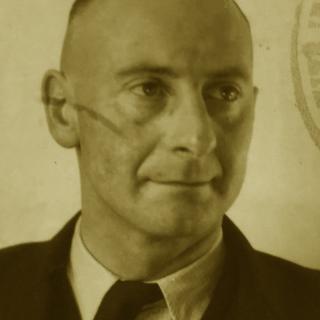Johann Jovanovits was born on 13 January 1913 in St Gallen, Switzerland. Driven from a young age by a desire to help others, he ultimately enrolled in medical school. After excelling in his studies, he went on to complete residencies in St. Gallen and Zurich over the course of several years. Johann was passionate about the scientific aspects of his work, yet he was also known for his sympathetic ear.
It was while working at the surgery clinic at the University Hospital of Zurich that, in 1945, Johann had an opportunity to contribute to the ICRC’s wartime activities. Following a short assignment to northern Italy in May of that year, he accepted a second assignment in early July, sponsored jointly by the ICRC and the Swiss Red Cross. His brief was to assess the conditions of displaced people in Germany, help set up the ICRC’s delegation in Vlotho and, upon request by the United Nations Relief and Rehabilitation Administration (UNRRA), develop a pilot tuberculosis screening programme in the British zone. Johann’s tasks took him all over Germany, including to Berlin when he needed to acquire certain authorizations, and he worked comfortably alongside his British counterparts.
Following the success of the pilot programme, Johann was able to extend the screening to camps for displaced people. He also informed his superiors of the wide range of medical needs prevalent among two other groups: prisoners of war and civilians. In recognition of his professional skills and
resourcefulness, Johann was subsequently charged with coordinating the medical services provided by the ICRC, le Don Suisse (today Swissaid) and the Swiss Red Cross for all these groups in Germany.
Johann remained in Germany for his final assignment, in which he was responsible for assessing the urgency of requests for medical support, overseeing the doctors working for the ICRC’s delegations, managing the distribution of medicines, monitoring the ICRC’s medical teams and encouraging the development of local medical organizations. It was while carrying out his duties on 4 February 1946 that Johann was killed: he was travelling by car in Baden-Baden when he was shot by a sentry whose signal he had not seen. Johann was 33 years old.
Johann possessed a strong humanitarian ethic and was prepared to provide his services wherever they were most needed. He was also a warm, reliable and lively companion with a keen sense of humour. His loss was deeply felt by his colleagues and loved ones.
